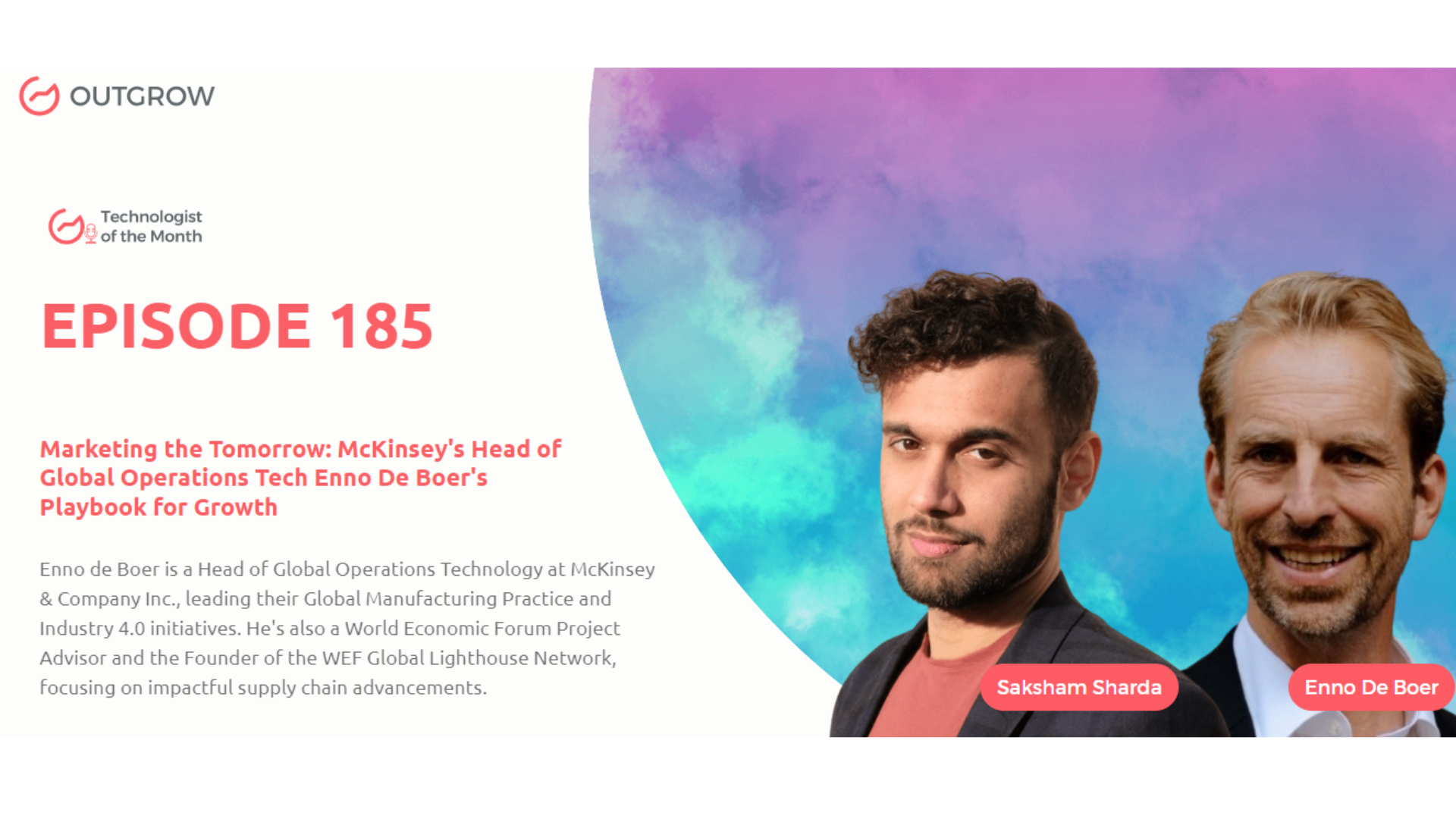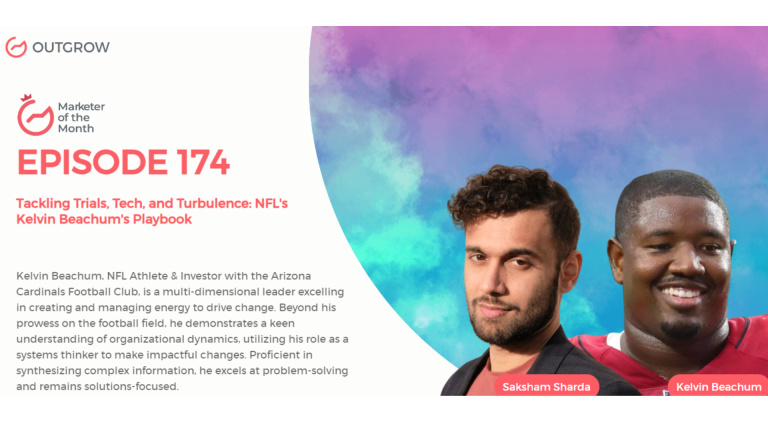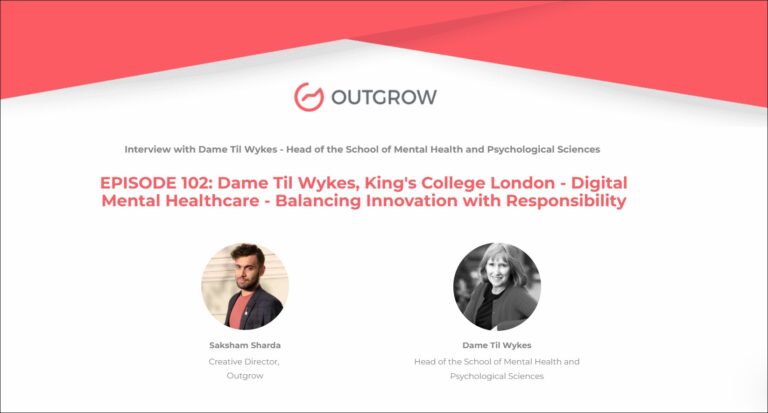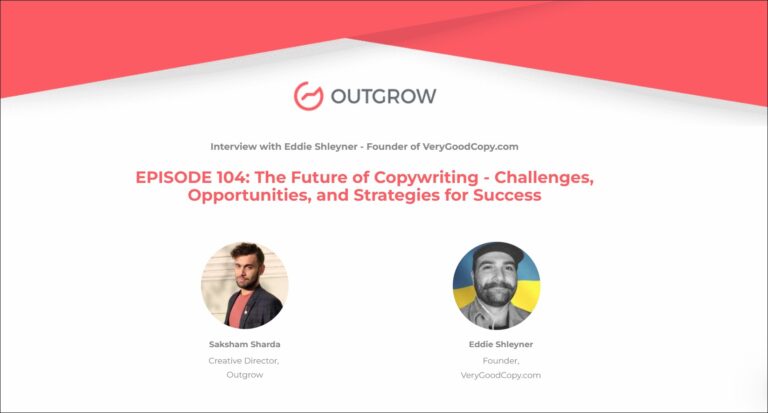Hey there! Welcome to the Marketer Of The Month blog!
We recently interviewed Enno De Boer for our monthly podcast – ‘Marketer of the Month’! We had some amazing insightful conversations with Enno and here’s what we discussed about –
1. Leadership focus, change management, and modernizing technology stack are crucial for success.
2. Approach to implementing Industry 4.0 technologies remains consistent across various sectors.
3. Anticipates manufacturing companies becoming major tech leaders, integrating diverse technologies.
4. Focus on adopting existing innovations, simplifying user interfaces, and driving technology integration.
5. Leveraging digital capabilities to simultaneously improve productivity, sustainability, and workforce engagement.
6. No inherent conflict between profit motives and environmental/social responsibility, with the smart use of digital capabilities.
About our host:
Dr. Saksham Sharda is the Chief Information Officer at Outgrow.co. He specializes in data collection, analysis, filtering, and transfer by means of widgets and applets. Interactive, cultural, and trending widgets designed by him have been featured on TrendHunter, Alibaba, ProductHunt, New York Marketing Association, FactoryBerlin, Digimarcon Silicon Valley, and at The European Affiliate Summit.
About our guest:
Enno de Boer is a Head of Global Operations Technology at McKinsey & Company Inc., leading their Global Manufacturing Practice and Industry 4.0 initiatives. He’s also a World Economic Forum Project Advisor and the Founder of the WEF Global Lighthouse Network, focusing on impactful supply chain advancements.
EPISODE 185: Marketing the Tomorrow: McKinsey’s Head of Global Operations Tech Enno De Boer’s Playbook for Growth
Table of Contents
The Intro!
Saksham Sharda: Hi, everyone. Welcome to another episode of Outgrow’s Marketer of the Month. I’m your host, Dr. Saksham Sharda, and I’m the creative director at Outgrow. co. And for this month we are going to interview Enno De Boer, Head of Global Operations Technology at McKinsey & Company Inc.
Enno De Boer: Great to be here. Thank you.
Don’t have time to read? No problem, just watch the Podcast!
Or you can just listen to it on Spotify!
The Rapid Fire Round!

Saksham Sharda: At what age do you want to retire?
Enno De Boer: 45. That was a couple of years ago.
Saksham Sharda: How long does it take you to get ready in the mornings?
Enno De Boer: Three minutes.
Saksham Sharda: Most embarrassing moment of your life.
Enno De Boer: Too many
Saksham Sharda: Favorite color.
Enno De Boer: Blue.
Saksham Sharda: What time of day are you most inspired?
Enno De Boer: Around 9:30.
Saksham Sharda: How many hours of sleep can you survive on?
Enno De Boer: Seven and a half.
Saksham Sharda: Fill in the blank. An upcoming technology or marketing trend is _____.
Enno De Boer: I have no clue.
Saksham Sharda: The city in which the best kiss of your life happened.
Enno De Boer: Wow. That’s why I can’t disclose that pass then. It’s not a pass, but I can’t disclose it.
Saksham Sharda: Pick one. Mark Zuckerberg or Elon Musk.
Enno De Boer: Elon.
Saksham Sharda: The biggest mistake of your career.
Enno De Boer: Starting in an industry that is a low-margin industry.
Saksham Sharda: How do you relax?
Enno De Boer: Kite surfing, sailing, snowboarding.
Saksham Sharda: How many cups of coffee do you drink per day?
Enno De Boer: Too many. Probably five.
Saksham Sharda: A habit of yours that you hate?
Enno De Boer: I have no patience.
Saksham Sharda: The most valuable skill you’ve learned in life?
Enno De Boer: Valuable skill. That’s a good question. Being edgy.
Saksham Sharda: One-word description of your leadership style.
Enno De Boer: Centered edgy, innovative.
Saksham Sharda: Edgy. Sounds like a repetitive word in this interview. The top priority in your daily schedule.
Enno De Boer: Doing something new, something fun.
Saksham Sharda: An ideal vacation spot for relaxation.
Enno De Boer: Any kind of big wave.
Saksham Sharda: Key factor for maintaining a work-life balance.
Enno De Boer: Relaxing on the weekends, taking the weekends off, having some good summers, and yeah, just getting, getting some time off with family and friends.
The Big Questions!

Saksham Sharda: Okay. So that was the end of the rapid-fire round. Okay. We can go on to the longer questions, which you can answer. Okay. As much ease as time. Yes. As you like. The first one is, what inspired you to establish the WEF Global Lighthouse Network, and what impact do you hope it would have on global supply chains?
Enno De Boer: So the inspiration came from literally looking at the old days when lean was invented. Everyone was traveling to Japan to understand what Toyota, Honda, and others had done in terms of lean manufacturing. And then they came back to their factories and would kind of build their production system and make it their very own. What we figured out with the force of the Industrial Revolution, there was nothing such as one place to travel to. So the inspiration was to create this platform where you would go to and find the best kind of supply chains of the world that have embraced technology to drive outsize impact. That is a light office platform at the moment. We have 153 lighthouses on that platform and it’s, and it gives us a future, a view into what manufacturing will look like.
Saksham Sharda: And what are the challenges you’ve encountered with this in trying to make this happen? Are there any regulatory challenges or anything that poses a risk?
Enno De Boer: There are many challenges as we embark on that journey, and I would say we’re still at the very beginning of this journey. Its leadership challenges stay focused like literally planning our way back and connecting it to the business strategy. The entire change management that is needed to bring in these new ways of working that augment the frontline and the workforce. And it’s literally, it’s about modernizing the technology stack to allow seamless and easy adoption. I think it’s all about user adoption. So gen AI is a big topic these days. I believe it will not bring so many new use cases, but it will make the user adoption and the user interface so much easier that we will see faster adoption.
Saksham Sharda: So if it’s not Gen AI, then what is not so much highlighted by the world today that is gonna take its place?
Enno De Boer: I think it’s like, look, the, the fun part of this is that probably manufacturing companies will be the biggest technology companies in the world because all these technologies are coming together on the shop floor, be it robotics, be it IOT Gen AI, 3D printing any kind of technology is coming together on the shop floor needs to be put together to drive real kind of impact on the shop floor.
Saksham Sharda: So your expertise spans various industries from technology to consumer goods. How do you approach implementing industry 4.0 technologies differently across these sectors?
Enno De Boer: Excellent questions. So we found that it doesn’t really matter in which industry you are, that’s why we set up the world global lighthouse network with the word economic forum industry agnostic. So we have lighthouses, a big portion comes from advanced industry, electronics industry. But then there’s also a big set from consumer product group companies, CPG, from life science, from the process industry. So it’s going across, I think the learning is cross-industry. Of course, every industry, but even every factory and every company has different goals to achieve, be it agility, sustainability, quality, productivity, or workforce engagement. And as such, it always depends on what you want to achieve. And how do you put that together?
Saksham Sharda: Is there any memorable non-tech adoption of this that you can talk about today with a particular company? Anything that comes to mind?
Enno De Boer: Well, I think there, many industries, that I would not say tech industries. So, you could say all the consumer goods companies that are adopting it. We had one of the latest lighthouses from the beauty industry. We have lighthouses in terms of steel making. So, any kind of manufacturing company is benefiting from the technology and how we are bringing the technology to improve sustainability, but also productivity or, literally just a kind of workforce engagement.
Saksham Sharda: As the head of global operations technology at McKinsey and Company, what do you see as the biggest hurdles for companies transitioning from Industry 4.0 to Industry 5.0?
Saksham Sharda: Couple of things. Number one, leadership, like really staying focused, on what outcomes you want to drive and putting the right use cases behind it. Number two is scaling from the very get-go. Think about how you scale the use cases across the network. Number three is change management. How do you take your management along? And then how do you kind of get user adoption with your workforce? And then lastly, I think it’s about modernizing the tech stack in a way that you’re not running too fast ahead. You want to do this in a self-funding way, and you can do that but you can also not wait until the very last minute to upgrade your technology.
Saksham Sharda: And what advice would you give to companies who want to stay ahead of the curve in this next industrial revolution?
Enno De Boer: Learn, learn, learn learn from the Global Lighthouse network. See what use cases have been successfully adopted, and what return on investment they’ll give. We have over 700 use cases that we are seeing used over and over again. 200 out of them are AI-powered. The returns are very attractive. Some of the use case bundles have 10 times returns. On average we see three to five times. There is no need anymore to do any kind of pilots and proof of concept. It’s all about figuring from day one out, how you scale this. How do you bring it across your network?
Saksham Sharda: You said 200 of the use cases are AI-powered. What are the rest of them? What are they?
Enno De Boer: The majority of the use cases are simple digitizations of workflow. Some others are just connecting data and creating transparency, for faster decision-making. Others are planning tools that allow us to better plan our inventories in the factories. Some of them need AI, and some of them start with pure transparency and then later get AI introduced.
Saksham Sharda: So you’ve been involved in both academia and industry with a background in mechanical engineering and a PhD in the field. How do you see the role of academia evolving and shaping the future of manufacturing and industry 4.0?
Enno De Boer: The Ph.D. was a couple of years now ago. But I’m still very connected to research and academia., I would say bluntly at the moment we need to figure out the innovations that we have there, how we adopt them, and how we bring them to work rather than trying to innovate something new. But to do that, I think there’s a lot of research needed to figure out what is holding us back on user adoption. How can we simplify user interfaces and how do we make literally technology work more seamlessly together? So that’s where our belief, the research can help because it’s all of an adoption game.
Saksham Sharda: What do you think universities or research institutions can do to better prepare students for the demands of industry for wind zero?
Enno De Boer: I would say twofold. I think they have a really big mandate in terms of upskilling our new engineers, the next generation of engineers, they need to learn very different stuff than I have learned when I did my mechanical engineering studies. Now they need to understand robotics. They need to understand AI, they need to understand IoT. They need to understand how these things work together. They need to work with 3D printing. So, all these technologies they need to understand, but they need to understand in a systems engineering mindset, how they’re coming together and how they’re creating value. I think that’s a huge upskilling that we need to do with our future engineers. I think secondly, I think there is a lot of inspiration needed that we bring more students into engineering classes. And then thirdly, I think as we talked before, some research still needs to happen to further drive adoption and user adoption.
Saksham Sharda: So given your leadership role in McKinsey’s technology system for industry corporate Zero, could you elaborate on the key components of this ecosystem and how it supports clients in their digital transformation journeys?
Enno De Boer: Well, the key components are, from the get-go. We need the tech industry to come up with the right technology that’s easy to use. I think that’s part, and there’s an entire technology stack that’s needed. Secondly, I think we have the entire need for upskilling of the workforce, but also of the management that needs to happen. That can either happen in the universities, but it also needs to happen literally on the job in the company. So there, the private sector has to play a big role and then we need to drive the digital transformation. And that has to happen out of the private sector. Now the public sector also plays an important role too in bringing in the right boundaries and how do we use, for example, in a responsible way gen AI how do we set the right boundaries with data privacy and things like cybersecurity? So it’s a play of the private public sector, academia, and technology companies that are coming together.
Saksham Sharda: So let’s pivot to what your typical day at work looks like. So you work in the, you wake up in the morning and then?
Enno De Boer: wake up in the morning and get a cup of coffee. Typically I try to do a couple of the bigger problems I try to solve in the morning when I’m still fresh. Then after lunch, I am doing the majority of my meetings. And then, and then I try to do at the end of the day, not at the beginning of the day, all the emails and all that stuff, and then it starts over again.
Saksham Sharda: how many meetings would you say you’ve handled per day on average?
Enno De Boer: Between them, there’s a wide variety. Sometimes it’s three to five meetings. Sometimes it’s 20 minutes. It depends.
Saksham Sharda: So you’ve emphasized the importance of creating supply chains that solve the triple equation of people plus planet plus profit. Can you discuss some strategies or approaches that companies can adopt to achieve this balance effectively?
Enno De Boer: Yeah, so, I think it’s really interesting because back in the lean production days, there was kind of this question around whether you, you need to reduce your quality to have cost savings. Deming came out with that and said that the equation was flawed. It’s really about having high quality and high productivity. I think today we’re at the same point with digitization. I think it’s quite fun to see that you can be more productive and more sustainable and at the same time do something for the workforce. Because the digital technology below is literally kind of very similar. So the digital stack, but then if you intelligently put the use cases on top, you can achieve all of the three at once.
Saksham Sharda: So in your experience, what are some common misconceptions or challenges companies face when trying to align profit motives with environmental and social responsibility in their supply chain?
Enno De Boer: I think there are no conflicts. I think you just need to figure out what your business strategy is, and is the right thing to do. And then I think what we have seen with many of our lighthouses, once you have built your digital capability, built your digital stack, and have started to innovate by putting these use cases to work with a fraction of time, and resources, you can put in sustainability use cases, then they can be highly making you highly competitive. So, we encourage you to look in a very balanced way at use cases that drive productivity output agility, but also sustainability and workforce engagement.
Saksham Sharda: Alright, so the last question for you is of a personal kind again what would you be doing in your life, if not this?
Enno De Boer: I love this. I love factories and I wouldn’t want to do anything else.
Let’s Conclude!
Saksham Sharda: Thanks, everyone for joining us for this month’s episode of Outgrow’s Marketer of the Month. That was Enno De Boer, Head of Global Operations Technology at McKinsey & Company Inc.
Enno De Boer: Pleasure. Thanks for having me.
Saksham Sharda: Check out the website for more details and we’ll see you once again next month with another marketer of the month.





